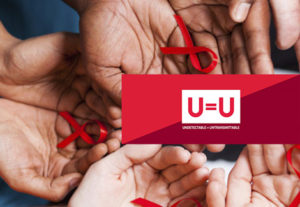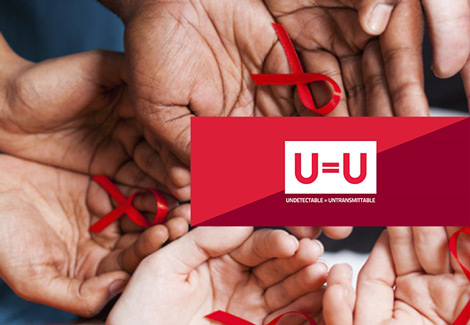HIV and AIDS: U=U and the message of hope for patient communities
By Ikenna Osuoha
The “Undetectable equal to Untransmittable” campaign (U=U) as launched by Joint UN Programme on HIV/AIDS (UNAIDS) has been described
as a message of hope for not only patient communities but all communities.
U=U is a campaign on how sexual transmission of HIV can be stopped.
When a person is living with HIV and is on effective treatment, it lowers the level of HIV (the viral load) in the blood and when the levels are low (below 200 copies/ml of blood measured), it is referred to as an undetectable viral load.
This is also medically known as virally suppressed, and at this stage, HIV cannot be passed on sexually.
 This scientific evidence was gathered from several studies, including thousands of heterosexual and gay couples in which one partner had HIV and the other did not.
This scientific evidence was gathered from several studies, including thousands of heterosexual and gay couples in which one partner had HIV and the other did not.
U=U applies to HIV transmission through sex only, as it does not apply to other Sexually Transmitted Diseases (STDs).
Dr Erasmus Morah, the Country Director of Joint UN Programme on HIV/AIDS (UNAIDS) had urged communities to take advantage of the campaign to reduce
stigma and discrimination.
He also urged all, either living with the virus or not, to join hands in reducing HIV prevalence to zero level by being regular with treatment.
According to him, UNAIDS’s determination to stop HIV transmission cannot be achieved without the involvement of communities, hence the theme of 2019 World AIDS Day “Communities make the Difference.”
The country director, who reiterated the importance of synergy in the fight against spread of the virus, called for an end to risky behaviours.
He said that UNAIDs would continue to support communities in line with the vision 90-90-90 target for 2030.
Vision 90-90-90 for 2030 is a projection that stipulates that by 2030, 90 per cent of the world’s population may have known their HIV status, while 90 per cent of those that tested positive are on treatment, and 90 per cent have achieved viral suppression.
Morah noted that “about 24 million people are on treatment worldwide’’ and hoped that 90 per cent viral suppression could be achieved with greater involvement of all in the treatment intervention.
Mr Abdulkadiri Ibrahim, the President of Network of People Living with HIV/AIDS in Nigeria (NEPWHAN) described U=U as a turning point for patient communities.
Ibrahim said that consistence in treatment certainly was a guarantee for viral load reduction.
He explained that transmission of virus would be impossible with a patient that had reduced his or her viral load with treatment.
The NEPWHAN coordinator urged people living with the virus to always take their medication, which he said was the only way to reduce the viral load, which could lead to U=U level.
He emphasised that “HIV has no cure, let us not be deceived, as many have died. Just stick to your drugs and you can live normally.’’
Ibrahim, who thanked UNAIDS and other partners for their support, promised to continue to speak against discrimination and stigma.
He urged governments at all levels to take critical steps in encouraging the war against AIDS.
According to him, people living with HIV should see Undetectable=Untransmittable campaign as a message of hope because it ensures access to treatment and viral suppression.
Dr Murphy Akpu, the Deputy Coordinator, U.S. President’s Emergency Plan for AIDS Relief (PEPFAR) called for change of narrative from deadly perception and nomenclature of AIDS in the rural areas in line with the “U=U” campaign.
Akpu said it was time to move along with the progress made so far in the fight against HIV and AIDS by changing the name from the dreadful to a lighter name.
He added that “HIV is no longer as deadly as being represented by the name in our different local languages.
“We need to change that dreadful former name in our localities to what it is really today.’’
The PEPFAR deputy coordinator, who saluted patient communities on behalf of the U.S embassy, commended them for their efforts in the war against the scourge.
Dr Gambo Aliyu, the Director General, National Agency for the Control of AIDS (NACA) reiterated the determination of the agency to continue to support the activities of NEPWHAN.
Aliyu expressed the desire of NACA to end the spread of the condition in the country and urged communities to always make the difference by shunning risky behaviours.
He said that the agency prioritised issues of prevention, treatment and sustainability in ensuring victory over the epidemic.
Mr Adeolu Adebiyi of World Health Organisation (WHO) appreciated the progress so far made in the fight against HIV and AIDS, especially with the launch of “U=U”.
Adebiyi explained that the community should be celebrating access to treatment regiment unlike in the past.
He expressed satisfaction over the availability of facilities for people living with the virus.
He said “HIV is no longer a death sentence, therefore, we need to collectively fight against stigma and discrimination because it has no medication.’’
Mrs Chidubem Momah, the Senior Programme Officer of an international NGO called FHI 360, commended communities “for their relentless efforts in stemming the epidemic and reducing stigma and discrimination.’’
She expressed the hope that there would be light at the end of the tunnel with collective responsibilities and commitment.
Mr Ikenna Nwakamma, the first Co-chairman of Coalition of Civil Societies Network for HIV/AIDS in Nigeria (CCSNHAN) called for continuous battle to win the war against HIV with awareness and public enlightenment on grey areas like discrimination and stigma.
Culled from NAN.




